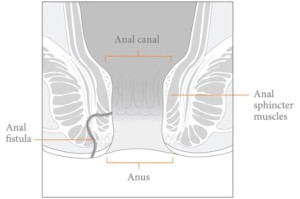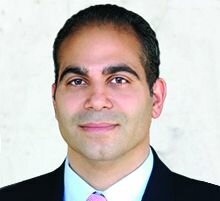 Anal fistulas are openings between the skin near the anus and the rectum that are usually caused by infection or a collection of pus in the anus. An anal fistula can also be the result of bowel conditions like inflammatory bowel disease (IBD) such as Crohn’s disease. As a result, it’s important to consider the causes, symptoms, and diagnosis of anal fistulas.
Anal fistulas are openings between the skin near the anus and the rectum that are usually caused by infection or a collection of pus in the anus. An anal fistula can also be the result of bowel conditions like inflammatory bowel disease (IBD) such as Crohn’s disease. As a result, it’s important to consider the causes, symptoms, and diagnosis of anal fistulas.
Our Los Angeles colorectal surgeons, at La Peer’s Fissure & Fistula Center of Excellence, regularly perform anal fistula repair surgery, but we carefully adapt our treatments to meet the individual needs of our patients. To find out how we can help treat your anal fistula, contact us today at (888) 512-2312.
Symptoms of Anal Fistulas
Different types of anal fistula exist. Some types of fistulas branch into more than one opening or cross the sphincter muscles that control the sphincter muscles, which control the opening and closing of the anus. Still others have merely a single connection running from the rectum to the skin.
If you experience any of the following signs and symptoms of anal fistulas, you should speak with your doctor or a colorectal surgeon:
- Pain in and around the anus
- Anal swelling in and around the anus
- Irritated skin around the anus
- Anal leakage of pus or blood from the anus
- Problems with bowel control
- Anal discharge
- Anal cyst
Diagnosis
Anyone with an unusual anal fistula that does not respond to conservative treatment (antibiotics or medication) should be examined for Crohn’s
disease, since a fistula is often the first sign of Crohn’s disease. An examination may include anoscopy or sigmoidoscopy, procedures that allow a doctor to view the lower rectum and lower large intestine through a viewing scope. Complete evaluation may require sedation because examination of the area can cause discomfort.
Other diagnostic tools include a fistula probe, a tiny instrument that can be inserted through the fistula, which can be used. An MRI can be performed as well to find out if the anal fistula is linked to any of the sphincter muscles.
Treatment Options
An anal fistula can often be treated with medicines, though sometimes surgery to repair the fistula may be needed. Conservative treatment, including antibiotics and medicines to reduce pain and inflammation, is usually tried before surgery.
If conservative treatment fails, surgery is usually the way to treat anal fistulas. The procedure is known as an anal fistulotomy. Anal fistulotomy is an outpatient procedure in which the surgeon cuts the fistula’s internal opening, scrapes and flushes out the infected tissue, flattens the channel and stitches it in place. The procedure takes place under sedation with local anesthesia so that patients are pain-free.
The goals are to repair the anal fistula completely to prevent recurrence, and to avoid damaging the sphincter muscles, which can lead to fecal incontinence.
Anal Fistula FAQs
Q: Does an anal abscess or anal cyst always result in a fistula?
A: Many anal abscesses do not result in an anal fistula. A fistula only develops in about half of all abscess cases?
Q: Do anal fistulas heal without treatment?
A: Fistulas rarely heal without treatment. Getting them to close will require some form of treatment.
Q: What will I need to do to prepare for surgery?
A: You will be asked to not eat or drink anything after midnight the night before your surgery, and you will be given specific instructions from your surgeon or anesthesiologist about which medications you should or should not take prior to your surgery. You should not take any blood thinning medications, such as aspirin, Ibuprofen, Coumadin, Plavix, or goody’s powder at least 5 days prior to your operation.
You may or may not have to bowel prep for your surgery. This will vary depending on exactly what procedure you are having and your surgeon’s preference. This will all be discussed in detail with your surgeon during your pre-op visit.
Q: How soon can I return to normal activity or work after surgery?
A: You should be able to return to work within 1-4 weeks after surgery, depending on the extent of your anal fistula surgery.
Q: Do anal fistulas recur?
A: In about 10 to 20 percent of cases, the wound does not heal completely or may get opened again. In such cases, another operation is performed.
Contact Colorectal Surgeons in Los Angeles
Our doctors at the Fissure & Fistula Center of Excellence are here to help! For more detailed information on different types of surgery for anal fistulas and non-operative management of anal fistulas, contact our Los Angeles office at (888) 512-2312 and ask to speak with our board-certified colorectal surgeons.
Please read this article on WebMD regarding anal fistulas.
Next, read about fistulotomy.









